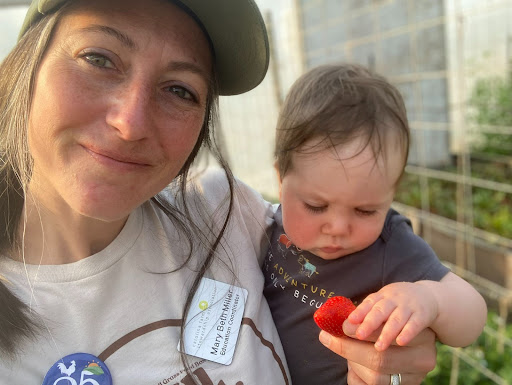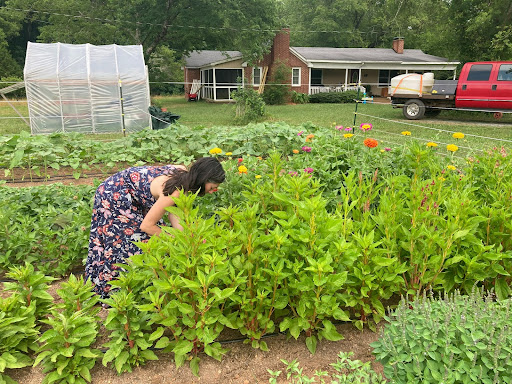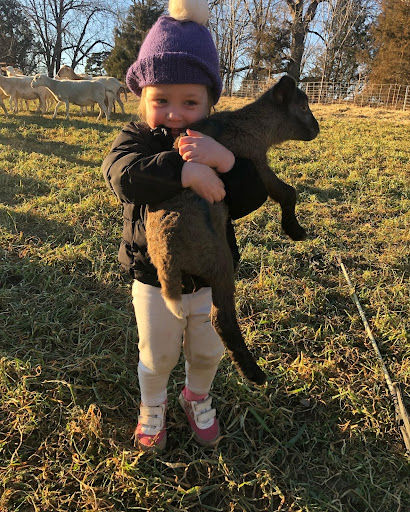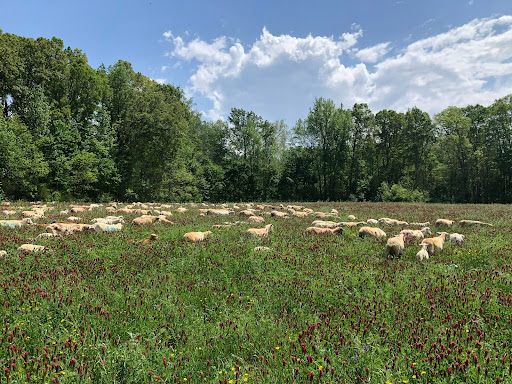by Ashley See, CFSA Communications Manager | Friday, Aug. 19, 2022 –

Mary Beth, CFSA Education Coordinator, enjoying strawberries with her son Ash at Okfuskee Farm during the 2022 Piedmont Farm Tour.
Here at CFSA, we want to let readers get to know our staff better. Beyond job titles and duties, what interests, passions, and hobbies do the Carolina Farm Stewardship Association staff have?
Next up in the series, we’re introducing Mary Beth Miller, CFSA Education Coordinator.
If there’s a big event at CFSA, then Mary Beth is the one making it happen. She’s whip-smart, has advocated for the planet since she was in knee socks, writes the sweetest thank-you notes, and stays on top of the latest in sustainable food and farming. She also has a small farm in Chapel Hill, North Carolina, with her husband, two young children, and their big ol’ flock of sheep. While it’s hard to say who invented the phrase “cool as a cucumber,” we’re confident Mary Beth is its embodiment. Here’s to hoping we have this cucumber for many more conferences and farm tours!
We’ll hand it over to Mary Beth now that you’re loosely acquainted.
Tell us your food story. What brought you to local food and farming?
Mary Beth: Like so many of my peers, I do not come from a farming background but worked on a small farm after graduating college. I never intended to work in sustainable agriculture long-term, but I fell in love with the work and the community, and I met and fell in love with another human (my now husband, Brock) who shared a budding desire to build a life around growing and raising local food and giving back to the land.
Together we started our own little vegetable production business, selling at a farmers market and to some restaurants and wholesalers. I worked on the farm during the day and waited tables at night, and Brock managed livestock for another farm. We did that for almost five years and nearly burned ourselves out before we realized what we were doing was not truly sustainable and that we needed to take a step back and reevaluate our physical and financial capacity. We’ve been slowly rebuilding and reimagining our agricultural pursuits ever since.
Now, I maintain a sizable garden at home, and Brock manages a large flock of sheep to graze on solar farms, which is our agricultural focus for the foreseeable future.

Mary Beth tending to the flowers in the family’s home garden.
You’ve been at CFSA since 2017. What are some of the duties of your position that delight you the most?
Mary Beth: I love when I can actually get out to farms and speak with growers, see their operations, and learn from the farmers and stewards of the land. I ask a lot of questions! Every farm has its own personality built by its unique climate, geography, and history, and I delight in visiting new farms and seeing how familiar farms change over time.
I also like being able to make connections with and for our members. I speak with so many people over the course of planning events that my role positions me in a way to make connections for people whose paths might not naturally cross.
When you’re not planning CFSA’s big conference or the farm tour, what does life outside of CFSA look like?
Mary Beth: Life revolves around two little humans and a large flock of sheep. I have a three-year-old daughter and a one-year-old son, and parenting kids this age is chaotic and exhausting, but it’s also a lot of fun. Watching them grow up on the farm and including them in tasks—from planting in the garden and bottle-feeding baby lambs to harvesting fresh potatoes and helping with meal prep—has been one of my greatest joys as a parent.
Weekends are spent at the farmers market, visiting with family, or meeting friends at the Museum of Life and Science.

Mary Beth’s oldest, Ada, loves to help with the lambs.
You recently bought undeveloped land and are slowly readying it for living and farming. Any advice to those considering the same?
Mary Beth: Slowly is the keyword here. Brock and I developed a vision early into our farming careers in 2011, and though it has evolved and shifted since then, it’s been a slow and steady journey to get to where we are now. We spent ten years saving money, honing our skills, building a network, and searching for the perfect piece of farmland to put down permanent roots.
We (finally!) purchased 30 acres in 2020, but it will be another nine months before our house is built and we live there. We’ve already started rehabilitating the soil after decades of conventional farming, but it is going to be a long process to rebuild soil biology, establish perennial grasses, and restore biodiversity.
For those considering purchasing land to farm: Exercise patience, lean on your community, ask lots of questions, and when you find the right piece of land, be open to cooperative ownership agreements.

Above: Sheep graze crimson clover and hairy vetch on Mary Beth and Brock’s new farm in Cedar Grove, NC.
We all have something we’re hyper-nerdy for. A little birdy told us that you love ag policy. Where does this love come from, and how is it currently cropping up?
Mary Beth: Policy explains so much about why we are where we are today with food and agriculture. And understanding it is the first step in dismantling and rebuilding our current food system, from production to consumption.
As an undergrad, I studied environmental policy and decision-making and was a big climate solutions advocate. My brother, Lee, was working on issues related to the farm bill, so conversations with him brought the ag piece into focus, especially regarding climate change.
If you could have a farm anywhere and only grow and eat three crops (ignoring all practicality), where would it be, and what would you grow?
Mary Beth: I love the North Carolina piedmont, but I would live in El Bolsón, Argentina, in northern Patagonia. The winters are cold and wet, but the near-perfect summers and gorgeous landscapes make up for it.
“For those considering purchasing land to farm: Exercise patience, lean on your community, ask lots of questions, and when you find the right piece of land, be open to cooperative ownership agreements.”
I would grow sweet potatoes since they’re a twofer with edible leaves and tubers. I would also grow okra, as it is the perfect vegetable. It can be prepared in many different ways and is so versatile, with just about every part of the plant being edible or usable (shout out to Chris Smith’s The Whole Okra). And I would grow Nebbiolo grapes to make fermented grape juice.
What are you reading right now, and what recipe are you obsessed with?
Mary Beth: Unless it’s a book that I can’t put down (like most recently Kim Stanley Robinson’s The Ministry for the Future), then I take forever to consume books because I get distracted and start new ones, and I have very little “me” time to read.
There are currently five books on my nightstand that I’m somewhere in the middle of reading:
- The Seed Underground (Janisse Ray)
- A Carnival of Snackery (Sedaris)
- Goldenrod (a book of poetry by Maggie Smith)
- We Are Each Other’s Harvest (Natalie Baszile)
- And a book on learning American Sign Language.
I’m also reading lots of board books and Ada Twist, Scientist. Over and over and over. And over.
I’m obsessed with any recipe that will get a three-year-old to eat dinner.

Brock and Ada check the sheep in the pasture.
Given the choice of anyone in the world, who would you want as a dinner guest?
Mary Beth: I want to share a meal with my grandmothers. I was close to them well into adulthood, but I have so many questions for them now that I’m a mother and they have passed.
Lastly, what do you wish folks in the food and farming community discussed more?
Mary Beth: I want to move past just talking about climate change impacts and into how we plan to care for each other as the impacts worsen. We can make our farms more resilient through good land stewardship and regenerative practices, so how are we taking those same principles and applying them to our communities?
I also want to see more advocacy on behalf of everyone throughout the local food system to hold fossil fuel companies and CAFOs responsible and accountable. We cannot just opt out of industrial food systems and assume we are doing enough or that things will get better. I barely passed college physics, but I think Newton’s Third Law can be applied to advocacy and action around climate change policy. We need to apply equal or greater force in the direction of renewable, regenerative, reciprocal systems.
Whether you want to hear more about how to get involved in CFSA’s events, have a question, or want to say hello, Mary Beth can be reached at marybeth@carolinafarmstewards.org.
Image credit and permission given by Mary Beth Miller.


